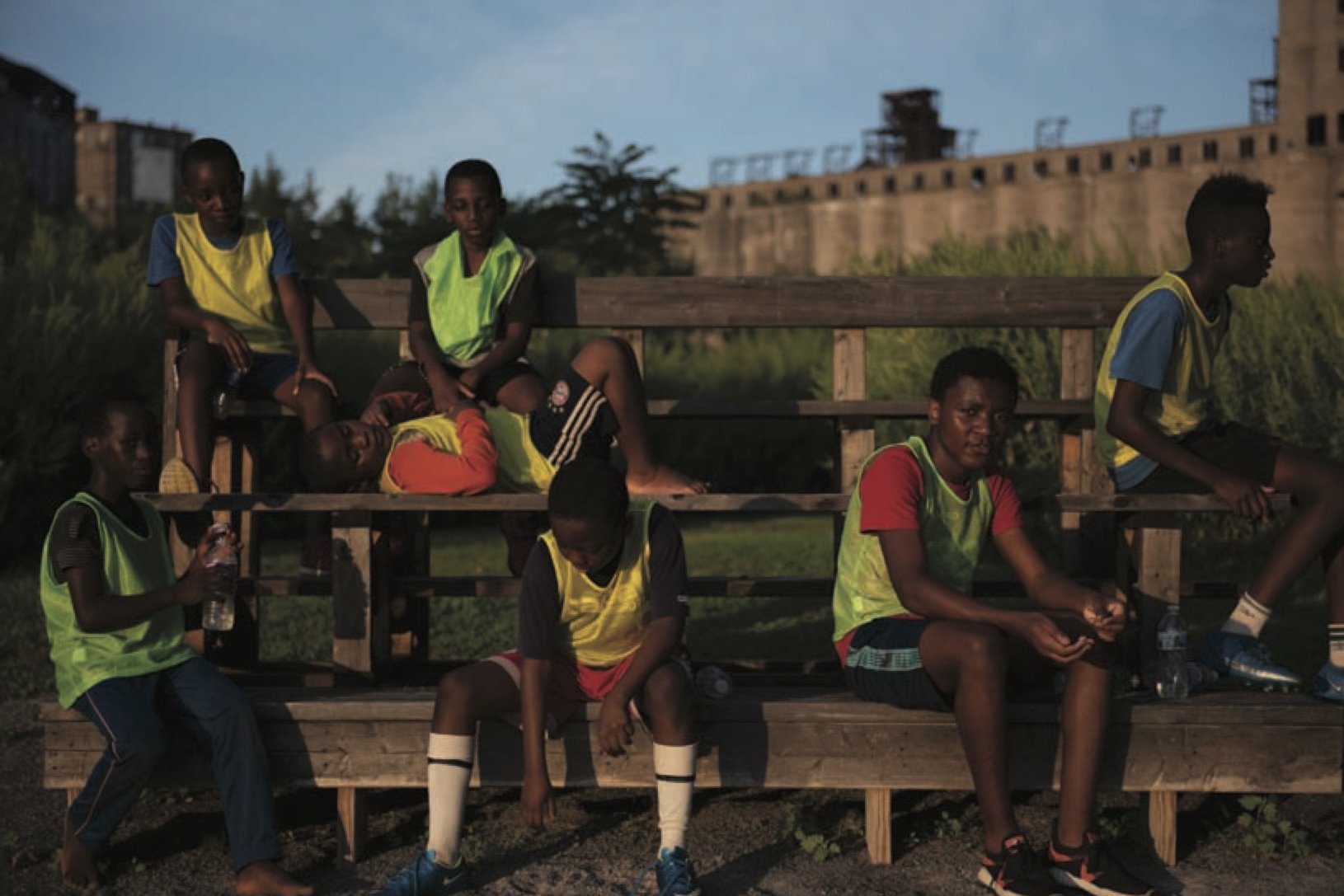maendeleo!
It’s a late August evening, still hot as the sun approaches the horizon. I’m sitting on one of a pair of small wooden bleachers that line the side of Silo City’s newly cleared soccer pitch. Behind one goal, Buffalo’s ancient grain mills are bathed in deep orange sunlight. Behind the other, the Rigidized Metals parking lot sits mostly empty. Two mesh bags of soccer balls lay on the ground beside the bleachers with a stack of neon disc cones and a few cases of bottled water.
A few minutes after I take my seat, I hear the whoops and laughter of little boys, then the crunch of golf cart tires on gravel and Rick Smith’s voice: “Maendeleo! Maendeleo!”
Before the cart comes to a full stop , seven or eight boys hop off the back and descend on the soccer balls. A few of them kick off their shoes as they run onto the pitch. They fall naturally into a semi-structured drill–one boy takes his position in goal while the others line up halfway across the field and begin shooting. After each shot, the boy who kicked the ball, into the net, into the goalie’s arms, or somewhere outside the goalposts, runs to take the goalie’s place while the goalie runs to the back of the line.
They shout and chatter in a mix of English and Swahili. They laugh with and at each other. It’s contagious–I’m laughing and smiling as if I’m part of their game, though in reality they don’t seem to know I’m sitting here. They’re too caught up in their joy.
This is the scene at day one of the Maendeleo soccer camp organized by Rick Smith and Gabriel Shalamba for Buffalo’s migrant and refugee boys.
Smith is the Buffalo born-and-raised owner of Rigidized Metals and Silo City. Shalamba is an immigrant from the Democratic Republic of the Congo who arrived in Buffalo in 2005. He’s a refugee and immigrant assistance specialist with Journey’s End Refugee Services and a sometimes bartender at Duende–the bar and restaurant nestled between Silo City’s grain mills and ecological regeneration projects–who speaks some eight languages and coaches adults’ and children’s soccer leagues around Buffalo.
Smith and Shalamba met through their kids’ soccer league, where they struck up a friendship and developed a shared vision for a no-cost soccer camp where the children of Buffalo’s vibrant refugee community could meet, play, and train together a couple times a week.
Smith and his team at Silo City got the invasive mugwort cleared out of the piece of land where the manicured soccer pitch now sits by partnering with Let’s Goat Buffalo, a project that brings retired milking goats and their male offspring to sites in need of landscaping–or, more accurately, “goatscaping.” It’s a highly effective, environmentally sustainable alternative to traditional herbicides and landscaping tools–fitting for Silo City, where complementing the natural ecology instead of battling it has always been the goal.
Shalamba connected with his network of fellow Central African migrant and refugee families to recruit the camp’s 2021 class of boys ranging in age from six to 18, most from the DRC like Shalamba himself and neighboring Rwanda and Burundi.
Together, they collected the equipment–nets, balls, drill cones, shin guards, gloves, and shoes–and set a schedule.
Finally, they gave their project a name: Maendeleo. It’s the Swahili word for development, progress, or advancement. It’s what Smith and Shalamba want the boys to get out of the experience.
After another two golf cart trips, Rick, Gabriel, and the boys–a dozen and a half or so in total–are all here.
Gabriel takes over direction of the drills, and the boys’ passing and shooting takes on a new structure. Though Gabriel laughs with the boys, I can see he’s also serious about teaching them how to play. Shifting seamlessly from English to Swahili to the local Bantu dialects familiar to all the boys, he gives equal parts discipline when the kids lose focus or miss marks and encouragement when he sees them excelling.
Meanwhile, Rick is calling the boys over one at a time to measure their feet. Each of them will receive a pair of soccer cleats as part of their participation in the camp. The new shoes will replace the various Crocs, basketball sneakers, and sandals most of the kids showed up in.
While Rick measures their feet, I take the opportunity to meet and chat with them.
I ask eight-year-old Enock if he’s played soccer a lot before, and he rolls his big brown eyes and tells me, “Yeah, like a million times.” Eliado, who’s up for measurement next, is shy–he gives me a smile but doesn’t add to Enock’s answer.
Mihotho, a couple years Enock’s senior, was the first boy to take up goaltending when he and his friends first jumped off the back of Rick’s golf cart.
“In Africa,” he tells me, “I was goalkeeper on my team.” Then he turns to Rick to ask if he’ll get goaltending gloves–his arms had begun hurting from all the shots he’d been deflecting, he explains.
After he’s measured, Mihotho runs back onto the pitch. I watch him position himself at the far end of the field and start dancing.
The sheer joy of being in the sun with his friends kicking soccer balls around him and Gabriel’s stern voice directing them to “dribble, dribble, shoot!” seems to pour off him.
While the aim on the one hand is to build real soccer skills in these boys, the true value of the Maendeleo soccer camp is the palpable sense of community it’s building for Buffalo’s migrant and refugee children.


